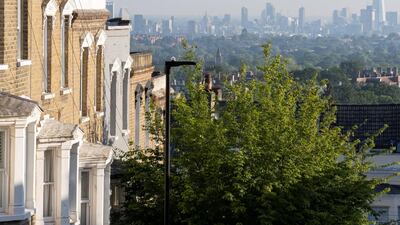Average house prices in Britain fell in April compared to March, ending 11 consecutive months of growth.
While UK average prices increased 8.9 per cent over the year to April to £250,772 ($353,933), they fell 1.9 per cent from March to April, the Office for National Statistics' House Price Index showed.
Sam Beckett, head of economic statistics at the ONS, said the March figure was inflated as buyers were rushing to complete purchases ahead of tax break on housing transactions initially set to conclude on March 20.
This was delayed until the end of June by Chancellor of the Exchequer Rishi Sunak.
“House prices continued to increase when compared with last year, with London once again showing the lowest annual growth with the slowing of prices most apparent within inner London boroughs,” Ms Beckett said.
House prices in London remained the highest in the UK but dropped to an average of £492,000 in April from an average of £500,000 in March, with the annual price rise only 3.3 per cent.
Meanwhile, prices in north-east England remained the lowest in the UK, at an average of £144,000, but saw the highest annual growth at 16.9 per cent with prices in the region now above their pre-financial crisis peak once again.
Sarah Coles, personal finance analyst at Hargreaves Lansdown, said the decrease in April was not a major shock because the stamp duty holiday deadline "sparked a frenzy" as buyers rushed to complete before the end of March.
“So much demand focused into a relatively short window created a price bump in March. In April, we saw this drop back slightly, as we tend to do after this kind of deadline,” she said.
However, the house price dip was “bound to unsettle homeowners” after almost a year of accelerating price rises.
“This isn’t necessarily the beginning of the end for house price growth, it’s more likely to be a sign of what an arbitrary deadline can do to a market,” Ms Coles said.
“At this stage we’re not expecting this to be the ultimate turning point for the market, but it’s a useful wake-up call for buyers and a reminder that house prices aren’t a one-way street.”
While the overall House Price Index shows a dip in April, earlier studies carried out by Nationwide and Halifax showed prices continuing to increase thanks to momentum from the stamp duty holiday.
While Nationwide said house prices surged at their strongest pace in 17 years in April, rising 2.1 per cent compared to March and taking the average to £238,831, Halifax said prices were up 1.4 per cent reaching a record average high of £258,204.


